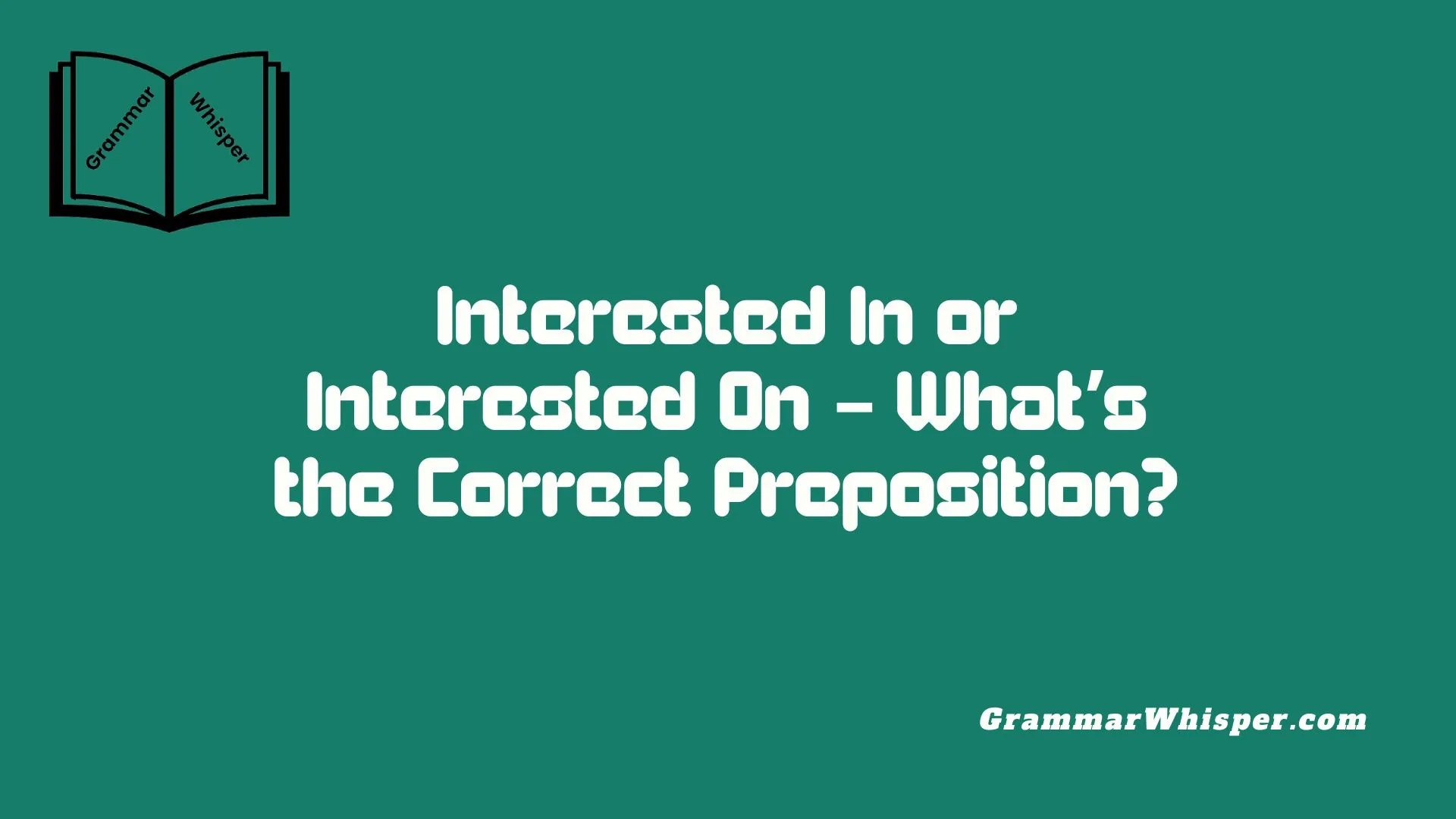When I began teaching English, one recurring question from students was whether it’s correct to say “Interested In or Interested On.” Many wondered why something that sounds natural in their native language feels awkward in English. The answer lies in the grammar, specifically the preposition following “interested.” It’s such a tiny word, but it can flip a sentence from sounding polished to slightly off. I’ve seen learners second-guess themselves when “interested on” pops up in informal contexts or translations. But if you want to sound natural and clear, the correct choice is always “interested in.” The phrase “interested on” is simply not used in standard English.
I still remember correcting this in a student’s essay for the first time. It was a passionate article, but one phrase stood out: “I’m interested on technology.” That one moment sparked a full discussion about language patterns. We explored real-life examples, analyzed how native speakers use the expression, and practiced it repeatedly in conversation until it became natural – without hesitation. Truly understanding the rule isn’t about memorizing facts; it’s about exposure and repetition. Once you’ve seen it used correctly often enough, you stop questioning it. You just use it. Over the years, teaching this has taught me that language habits form around the smallest pieces – and getting the right preposition is one of them.
The Adjective “Interested”: What It Really Means
Let’s start with the core of this confusion: the word “interested.”
“Interested” is a past participle adjective. That means it’s formed from a verb – interest – but it’s used to describe someone’s feelings or state of mind.
“I’m interested in music.” “She’s interested in working abroad.”
In both cases, “interested” expresses a mental or emotional engagement. It shows that the subject is paying attention to or has curiosity about something.
But – and here’s the key – it needs a preposition to link it to the thing you’re curious about. The correct one is “in.”
Why “Interested In” Sounds Right and “Interested On” Doesn’t
So why “in” and not “on”?
Let’s break it down using both grammar logic and intuition.
1. “In” Shows Engagement or Involvement
The preposition “in” often conveys a sense of being inside something – not physically, but mentally or emotionally.
“She’s in love.” “I’m in trouble.” “He’s in pain.”
It’s the same with interested:
“I’m interested in this topic.” → I’m mentally inside it, engaged with it.
2. “On” Implies Surface Contact
“On” usually means something is touching a surface, not entering it.
“The book is on the table.” “He placed the cup on the shelf.”
So saying:
❌ “I’m interested on this subject.” …feels off – because you’re not on the subject; you’re into it.
It’s a matter of choosing the preposition that aligns with the type of relationship you’re trying to describe. And “in” just fits naturally here.
What Grammar Says: Fixed Prepositional Collocations
Here’s a grammar term to keep in your pocket: collocation.
A collocation is a natural combination of words that go together. Like:
- “make a decision” (not “do a decision”)
- “strong coffee” (not “powerful coffee”)
“Interested in” is one of those fixed combinations. It’s a standard collocation in English.
Grammarians and style guides – including Cambridge, Merriam-Webster, and The British Council – all recognize “interested in” as the correct and accepted form.
🗣️ Cambridge Dictionary: “Interested in something” means wanting to give your attention to something or learn more about it.
That’s as clear as it gets.
Corpus Evidence: Real Usage Data from Actual English
Want real-world proof?
Let’s look at usage frequencies using linguistic databases like the Corpus of Contemporary American English (COCA) and Google Ngram Viewer:
| Phrase | Frequency in COCA (approx.) | Frequency in Google Books |
| Interested in | 150,000+ | Extremely common |
| Interested on | < 1,000 | Rare, often flagged as incorrect |
This isn’t just stylistic – it’s how real people use English. Native speakers overwhelmingly prefer “interested in.”
When “interested on” appears, it’s usually:
- A typo
- A non-native error
- Or a literal translation from another language
So the data backs it up. “Interested in” is the standard.
Examples: “Interested In” in Action
Let’s look at how “interested in” fits in different contexts. These examples are not only grammatically sound but reflect real-life usage across different domains.
Academic & Education
“He’s interested in studying economics.” “They’re interested in applying to Harvard.”
Work & Career
“We’re interested in expanding our team.” “I’m interested in learning project management.”
Personal Life & Hobbies
“She’s interested in photography.” “Are you interested in hiking this weekend?”
Romantic or Social Contexts
“I think he’s interested in you.” 😉 “She’s not interested in dating right now.”
In every case, “in” links the subject to an idea, activity, or person.
The Real Reason “Interested On” Is So Common
Here’s the twist.
Despite being incorrect, you’ll still hear or read “interested on” – especially from non-native speakers. Why?
Because in many languages (like Spanish, Portuguese, Tagalog, or Hindi), the equivalent verb or phrase uses a preposition that translates to “on.”
This leads to preposition transfer – a common ESL mistake where learners apply rules from their native language to English.
It’s a natural part of the learning process, but it’s still something that needs correction.
The Adjective “Interested”: What It Really Means
Let’s start with the core of this confusion: the word “interested.”
“Interested” is a past participle adjective. That means it’s formed from a verb – interest – but it’s used to describe someone’s feelings or state of mind.
“I’m interested in music.” “She’s interested in working abroad.”
In both cases, “interested” expresses a mental or emotional engagement. It shows that the subject is paying attention to or has curiosity about something.
But – and here’s the key – it needs a preposition to link it to the thing you’re curious about. The correct one is “in.”
Final Thoughts
Language isn’t always logical, but in this case – it’s consistent. “Interested in” is the correct, widely accepted form in English. “Interested on” is grammatically incorrect and should be avoided.
If you want to sound fluent, polished, and professional, stick with “interested in.” Learn it as a set phrase and you’ll never go wrong.
FAQs
What does ‘interested in’ mean?
“Interested in” means you’re curious about or emotionally engaged with something. It shows a desire to know more or be involved.
Why do people say ‘interested on’?
Mostly because of language transfer. In other languages, the equivalent of “in” may be “on” when translated literally. It’s a common mistake by non-native speakers.
Is ‘interested to’ ever correct?
Yes – but only in certain constructions. For example: “I’m interested to hear more.” In this case, “interested to” is followed by a verb, not a noun.
Can I say ‘interested for’?
Generally, no. “Interested for” isn’t a natural collocation in English. It sounds awkward and is rarely used by native speakers.
How can I remember the right phrase?
Think of being “in the subject,” not “on it.” Imagine diving into a topic. You’re not just standing on it – you’re immersed in it. That mental image can help lock in the correct usage.











